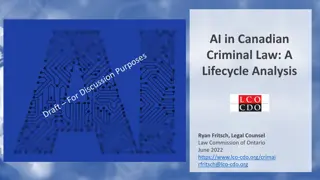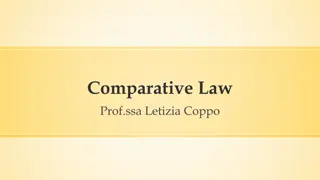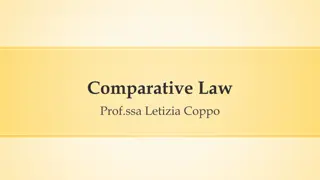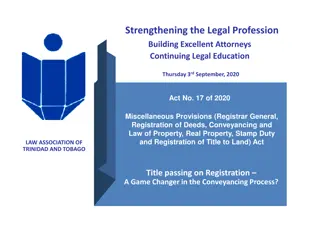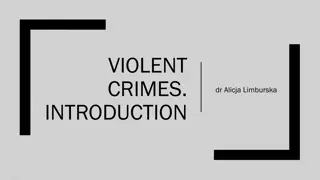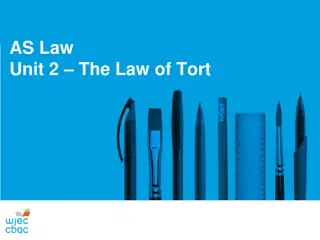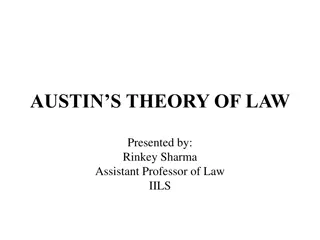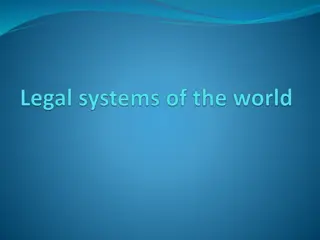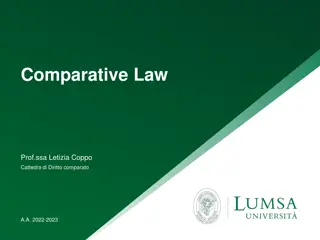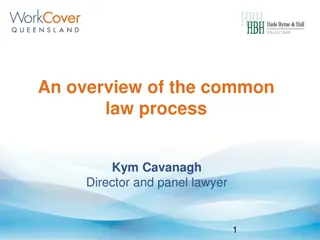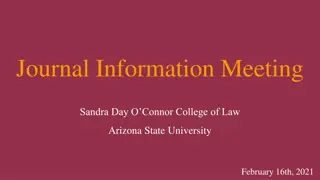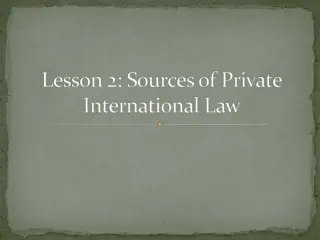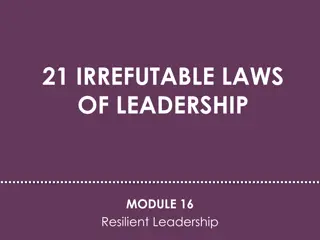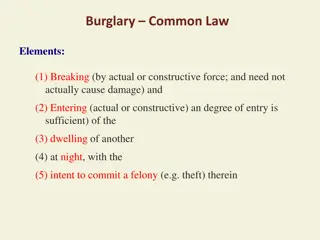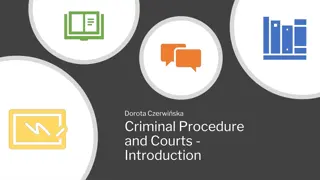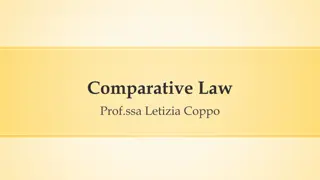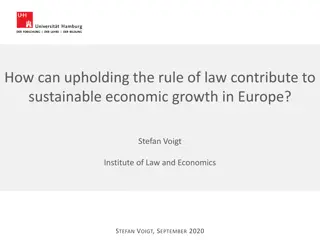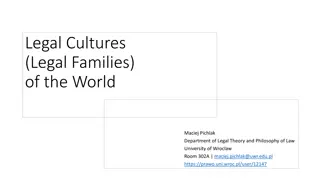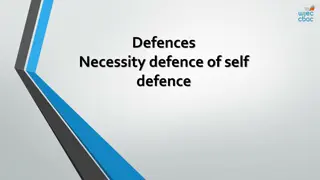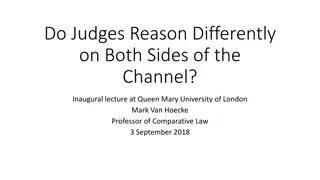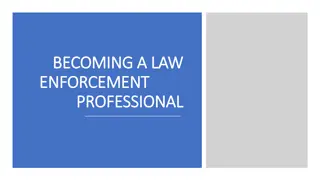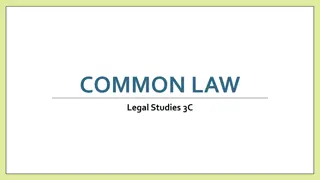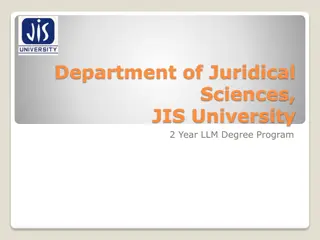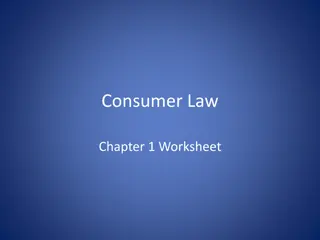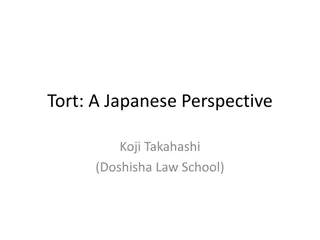Konw about our team
Know About Our Team:\nMr.Bageerathan\nMr. Bageerathan is a distinguished legal professional with a rich background spanning over 16 years in the legal field. He earned his Law degree from University Law College and further enhanced his legal acumen by obtaining Dual Masters degrees in Law (LL.M) fro
0 views • 4 slides
AI in Canadian Criminal Law: A Lifecycle Analysis
The Law Commission of Ontario (LCO) is at the forefront of assessing the impacts of AI on civil administrative and criminal law. While Canada has been slower in adopting AI tools compared to other jurisdictions, concerns such as access to justice, due process, and Charter rights are being raised. Th
1 views • 19 slides
Evolution of North American Law: From Common Law to Unique Legal Tradition
The historical origins of North American law trace back to the early 17th century, marked by the influence of English common law on the colonies. Over time, the American legal system evolved, absorbing elements from both the English legal tradition and local statutes. The development of the United S
0 views • 19 slides
Comparative Analysis of Civil Law vs. Common Law Traditions in Western Legal Systems
The study delves into the historical and philosophical foundations of Civil Law and Common Law traditions within the Western Legal framework, examining their divergences and convergences. It highlights the influence of historical backgrounds, legal systems' organization, and the impact of constituti
0 views • 31 slides
Evolution of Land Law Systems in Trinidad and Tobago
Trinidad and Tobago's land law systems consist of the Common Law System and the Registered Land System. The Common Law system governs unregistered land where title passes upon execution and delivery of the deed. In contrast, the Registered Land System confers ownership upon registration and offers c
0 views • 28 slides
Austin's Theory of Law by Rinkey Sharma: An Overview
Austin's Theory of Law, presented by Rinkey Sharma, delves into the Imperative Theory of Law as proposed by Austin, known as the father of English jurisprudence. It explores General and Particular Jurisprudence, Austin's definition of law, and the elements of positive law, emphasizing the concepts o
0 views • 11 slides
Understanding Criminal Offences: A Comparative Analysis
Exploring the concept of criminal offences, this article delves into the definitions in common law and continental law systems. It discusses the structural elements, harmful nature, prohibition, punishment, and distinctive aspects of criminal acts. A comparison between common law and continental law
1 views • 33 slides
Historical Origins and Formation of German Law: Influence of Roman Law
The historical origins and formation of German law were shaped significantly by the late contact with Roman law during the Medieval and Renaissance period. The weak central imperial power, rising influence of territorial rulers, and the lack of a common legal system in Germany prompted the appeal fo
0 views • 23 slides
Understanding Gas Laws: Boyle's, Charles', Gay-Lussac's, and Avogadro's Laws
Gas laws such as Boyle's Law, Charles' Law, Gay-Lussac's Law, and Avogadro's Law govern the behavior of gases under different conditions. Boyle's Law relates pressure and volume at constant temperature, Charles' Law relates volume and temperature at constant pressure, Gay-Lussac's Law relates pressu
1 views • 19 slides
Evolution of Trust Law in Malta
Malta, with a unique legal system integrating civil and common law concepts, has evolved its trust law over the years. The concept of trust was gradually adopted, culminating in full integration into domestic law post-2004. Recent amendments have further solidified the legal framework, bridging the
4 views • 150 slides
Insights on AS Law Unit 2: The Law of Tort Exam
Detailed feedback on the May 2019 AS Law Unit 2 exam focusing on topics like the Caparo three-part test for duty of care, causation in tort law, and breach of duty of care. The assessment highlights candidate performance, common mistakes, need for relevant case law, and key elements required for a c
0 views • 9 slides
Understanding the Rule of Law and Legal Systems in Wales and England
The content discusses the nature of law, the Welsh and English legal systems, and the Rule of Law doctrine. It includes observations from the 2019 AS Law Unit 1 examination, emphasizing the importance of adhering to rubrics and answering questions clearly. Candidates faced challenges with timing and
0 views • 14 slides
Austin's Theory of Law in Jurisprudence
Austin's Imperative Theory of Law, presented by Assistant Professor Rinkey Sharma, delves into the foundational concepts of English jurisprudence as formulated by Austin. His work categorizes jurisprudence into general and particular aspects, exploring principles common to various legal systems and
0 views • 11 slides
Contrasting Legal Systems Around the World
Explore the diverse legal families globally, such as Civil Law (Romano-Germanic) and Common Law (Anglo-American), along with their historical backgrounds, sources of law, and dominant ideologies. Delve into the distinctions between Civil Law and Common Law, their origins, development, and practical
0 views • 17 slides
Understanding General Criminal Law: Principles and Relationships
General Criminal Law encompasses rules governing offenses and their penalties, exploring the definitions of offenses, relationships with social sciences, other branches of law, and auxiliary sciences. This presentation covers the importance, sources, and branches of criminal law, highlighting its in
1 views • 230 slides
Understanding Murder in Common Law
Murder, as defined in common law, is the unlawful killing of a human being with malice aforethought. This act involves both actus reus (unlawful killing caused by the defendant) and mens rea (intention to kill or cause grievous bodily harm). Legal causation, including thin skull test, chain of causa
0 views • 18 slides
Understanding Legal Systems and Sources of Law
Legal systems are created through factors like rules forbidding or compelling conduct, compensation for injuries, court systems, and a rule-making body. Sources of law include statutes, customs, judicial decisions, legal principles, and jurists' opinions. There are different national legal systems w
0 views • 18 slides
Understanding Combined Gas Law and Ideal Gas Law for Final Exam Preparation
Explore the concepts of Combined Gas Law, Boyle's Law, Charles's Law, Gay-Lussac's Law, and their reflection in the Ideal Gas Law. Learn how to solve problems using these laws, prepare for your final exam scheduled for Tuesday, December 12 at 12:30 in the specified room. Dive into in-class practice
1 views • 23 slides
Overview of UK Law: Statute Law, Common Law, Criminal Law, Civil Law
Statute Law is written law created through the parliamentary process, forming the basis of the legal system. Common Law, on the other hand, is unwritten law based on judicial decisions and precedents. They govern different aspects such as civil and criminal matters, each with its unique characterist
0 views • 15 slides
Understanding Comparative Property Law in the Contemporary Legal Landscape
Comparative Property Law explores the common challenges and fundamental questions of contemporary tort law, covering topics such as tort liability, legal positions protected by tort law, criteria for attributing liability, compensatory, deterrence, and punitive functions of tort law, and more. The i
0 views • 37 slides
International Law Programs 2021: E-Castle Updates and Course Offerings
Explore the online programs offered by the International Law Programs in 2021 at the E-Castle. Discover the benefits, courses available, program dates, instructor insights, and more. From International Business Law to Public International Law, gain valuable knowledge and networking opportunities in
0 views • 21 slides
Guide to Common Law Process in Worker's Compensation Cases
Explore key aspects of the common law process in worker's compensation cases, including the definition of an injury and a worker, the difference between statutory and common law claims, employer's duty of care, requirements for pursuing a common law claim, and the typical course of action in such ca
0 views • 35 slides
Joining a Law Journal at Sandra Day O'Connor College of Law
Law journals at Sandra Day O'Connor College of Law offer valuable opportunities for students to enhance their legal skills, gain employment advantages, and build professional networks. Membership in a law journal provides leadership experiences, clerkship opportunities, and the chance to improve as
0 views • 17 slides
The Continuing Relevance of English Law to Irish Corporate Law Reform
English Law remains relevant in Irish corporate law reform, impacting areas like takeover regulation, deferred prosecution agreements, schemes of arrangement, and the comply or explain approach. The influence of English law is seen where there is no EU law dimension or when EU legislation allows mem
0 views • 10 slides
Understanding Private International Law: Key Principles and Treaty Regimes
This lesson delves into the sources, key principles, and treaty regimes of private international law. It covers jurisdictional competence, conflicts of law, recognition of foreign judgments, Canadian common law vs. Quebec civil law, Hague Conventions, and the United Nations Convention on Contracts f
1 views • 14 slides
Classification of Law: Understanding Different Types and Functions
Exploring the classification of law is essential for understanding the diverse nature of legal systems. This overview delves into domestic law vs. public international law, public law vs. private law, and the sub-divisions within public law, such as constitutional, administrative, and criminal law.
0 views • 19 slides
Laws of Leadership: Resilient Leadership Module
Explore the 21 Irrefutable Laws of Leadership Module on Resilient Leadership, covering essential principles such as the Law of the Lid, Law of Influence, Law of Process, Law of Navigation, Law of Addition, and Law of Solid Ground. Navigate through phases of leadership growth, learn to add value, bui
0 views • 37 slides
Understanding Burglary and Arson Laws: Common Law vs. Modern Rules
Burglary and arson laws have evolved from common law principles to modern statutes. In common law, burglary involves breaking and entering a dwelling at night with intent to commit a felony, while arson requires malicious burning of another's dwelling. Modern laws may vary, eliminating some elements
0 views • 6 slides
Overview of Legal Systems and Roman Law Development
Legal systems play a crucial role in governing societies, with Roman Law, Common Law, Civil Law, and Religious Law being some of the major types worldwide. Roman Law, focusing on private law, has influenced legal traditions in various regions, especially in Europe. Contrasting Common Law and Civil L
0 views • 26 slides
Fundamentals of Criminal Law and Procedure
Explore the key aspects of criminal law and procedure, including definitions of crime, the role of criminal procedure, sources of law, phases of the criminal process, participants involved, and rules of evidence in legal proceedings. Gain insight into how criminal law is distinct from civil law and
0 views • 24 slides
Evolution of English Law: From Common Law to Equity and Beyond
The historical origins and development of English law are traced from the XIV century when Equity emerged as a supplement to Common Law, to the XVI and XVII centuries marked by conflicts between the King and Parliament, the establishment of the Star Chamber, and victory of Parliament over the King.
0 views • 22 slides
Upholding the Rule of Law for Sustainable Economic Growth in Europe
Democracy and the rule of law are essential for sustained economic growth in Europe. The rule of law ensures stable and impartial enforcement of rules such as property rights and contract law, key for market economies. Upholding the rule of law is crucial for combating corruption and maintaining a f
0 views • 6 slides
Comparative Analysis of Legal Families Around the World
Explore the diverse legal cultures and families existing globally, including Civil Law, Common Law, Far East, Islamic, Hindu, and more. Learn about the historical background, methods of reasoning, institutions, sources of law, and dominant ideologies that characterize each legal family. Delve into t
0 views • 17 slides
Understanding Self-Defence Law: Necessity and Statutory Defences
Self-defence is a crucial aspect of criminal law, encompassing actions taken to protect oneself or others from harm. This includes both common law defences and statutory provisions such as those outlined in the Criminal Law Act 1967. The law allows individuals to use reasonable force in circumstance
0 views • 11 slides
Contrasting Legal Reasoning in Common Law and Continental Law Systems
This inaugural lecture explores the differences in legal reasoning between judges on both sides of the English Channel. It delves into the declaratory theory of decision-making in Common Law and the application of legislative intent in Continental Law. The lecture also touches on the contrasting ind
0 views • 48 slides
Guide to Law Enforcement Career: Recruitment Strategies & Qualities
Evaluating employment agencies, desired qualities of law enforcement officers, challenges in finding qualified applicants, and effective recruiting strategies are essential elements of a successful law enforcement recruitment process. The Law Enforcement Recruitment Toolkit provides valuable insight
0 views • 34 slides
Overview of Legal System in Australia
This content covers various aspects of the legal system in Australia, including common law, sources of law, court hierarchy, appeals process, federal courts, and the importance of judicial independence. It outlines the key components of the legal framework, such as the role of Parliament, judge-made
0 views • 36 slides
2-Year LLM Degree Program in Juridical Sciences at JIS University
Explore the 2-year LLM degree program offered by the Department of Juridical Sciences at JIS University, specializing in Corporate Law, Criminal Law, and Constitutional Law. The program covers a range of specializations such as Comparative Criminal Law, Human Rights, Corporate Law, Competition Law,
0 views • 7 slides
Understanding Consumer Law: Enactment and Application of Laws
This comprehensive worksheet delves into the different types of laws such as Constitutional Law, Statutory Law, Administrative Law, Case Law, and Ordinances. It provides insights on who enacts these laws and explores scenarios to determine the type of law that would likely apply. Enrich your knowled
0 views • 19 slides
Japanese Tort Law: Choice of Law Rules and Double-Actionability
Japanese tort law follows specific choice of law rules, determining the applicable law based on factors such as the place of injury, product liability, and defamation. The double-actionability rule ensures that the harmful act is also unlawful under Japanese law and that remedies are available. This
0 views • 14 slides

